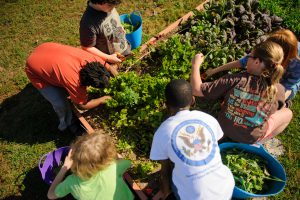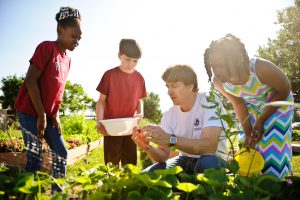
As childhood obesity continues its upward trend nationally, schools and community organizations are partnering to find solutions. One such solution is the advent of school gardens to get students outside the classroom and into the great outdoors.
A University of Alabama psychologist, however, wanted more than anecdotal evidence of the various programs’ success. She’s seeking to determine exactly what kind of an impact these projects have on students, both from a health and educational perspective.
“Working with children in the counseling realm, I noticed how much more time they were spending inside with video games, televisions and computers,” says Dr. Caroline Boxmeyer, a UA psychologist. “I noticed the same thing with children with ADHD and behavioral difficulties who especially need to move and get outside and engage in more hands-on learning.”
Boxmeyer began researching hands-on, educational models that included outdoor nature components about the time the Druid City Garden Project organization was established. It was a perfect partnership.
The Tuscaloosa nonprofit uses school gardens as a teaching tool, connecting students to their food source and teaching important nutritional information. It’s an effort to halt the rising rates of childhood obesity and Type 2 diabetes.
The organization uses a curriculum that ties into the state educational standards for math, science and reading. Weekly, students work in the garden, as well as hold farm stands after school to sell the produce grown.

The Druid City Garden Project was interested in developing an ongoing program evaluation to determine what impact its garden curriculum had on students. With the help of a $5,000 grant from UA’s College of Community Health Sciences and the Division of Community Affairs, Boxmeyer started a year-long study that would do just that.
The study, which took place in second- and third-grade classrooms at two Tuscaloosa City elementary schools, began in 2013. One school was a several-year participant in the garden curriculum while the other had just implemented it.
Boxmeyer says she looked at several outcomes, including children’s general knowledge about plants, fruits and vegetables and what produce is in common foods that they eat. She also documented their knowledge of how the produce grows and the different parts of the plants.
“We included measures of children’s food choices – how likely they were to eat fruits and vegetables, as well as less healthy food (soda, candy, fast food),” she says. “We also collected information about their academic performance – report card grades and standardized test scores. I was particularly interested in seeing if being able to go outside and have lessons in the garden impacted their school engagement in general.”
Boxmeyer surveyed students, teachers, school administrators and parents at the beginning of the school year and at the end of the school year. Teachers were asked to provide observations of the students’ interest and learning from the garden curriculum, as well as the perceived benefits and challenges of the program and what was needed to sustain it.
Parents were also surveyed about their children’s experience in the school garden, their perceptions of their children’s eating habits and their willingness to eat fresh fruits and vegetables versus other foods at home. Boxmeyer also assessed parental involvement in the school, the sense of school community and whether the school garden inspired families to plant their own home gardens.
“By far the strongest and most consistent effects are on the child’s willingness to eat vegetables,” Boxmeyer says. “In addition to the empirical findings, we heard a lot of anecdotal stories from parents to back it up – ‘My child would absolutely not eat a green vegetable before having the garden at their school, and now they’ll eat these several things that they’ve had a hand in growing.’”

There also seems to be a clear relationship between the amount of time and the different school gardening roles the children had and his or her interest and engagement in school.
This is a huge plus for school administrators who may wonder if spending time in the garden is taking away from a student’s learning of math and reading, Boxmeyer says. Results clearly show that it does not take away, and, in fact, there is some indication of improved academic grades and standardized test scores in those areas, she says.
Students tended to be more engaged with meal selection and preparation at home, too, and they had a tendency to select healthier food options.

Study results not only provide concrete data for schools interested in school garden programs, it also opens the door for funding possibilities for the Druid City Garden Project, enabling them to expand their program into more schools in Tuscaloosa and surrounding areas. Boxmeyer says she would like to build on this initial study by applying for additional grant funding for a larger, randomized control trial in the future.
“From a mental health perspective, it’s really important for us to have empathy for ourselves and others, which is supported by having a connection to the natural world … and this is just one way that schools can help to be part of encouraging children to learn about, and connect with, nature and to learn health behaviors from an early age,” she says.
“A lot of times we work with folks on basic aspects of self care – healthy eating, good sleep, regular physical activity, and connecting with others in meaningful ways, Boxmeyer says. “Those are all really important aspects that can support our health and our mental health, but it can also be easy to get away from these things in our busy society. The earlier children learn the importance of these things, the greater the chance of it sticking as they become adults.”
Dr. Boxmeyer is an associate professor in the College of Community Health Sciences’ department of psychiatry and behavioral medicine.
